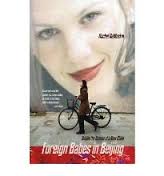Surprised Stranger in a Strange Land
One of my favorite movie scenes is from the 1939 Alfred Hitchcock thriller, The 39 Steps. Our hero, Richard Hannay (ably played by a dashing Robert Donat), is fleeing from police and spies. He darts into an auditorium, where he is mistaken for the featured speaker and led to the dais. Hundreds of eyes are upon him and the crowd grows restless. Without knowing the topic or the audience, Hannay launches into an impassioned speech, stringing together platitudes and general observations. He senses what the crowd wants and they are charmed. Hannay wins their support, just as he is whisked away by the police.
I thought of Hannay-Donat often while reading Rachel Dewoskin’s memoir, Foreign Babes in Beijing. It is a very entertaining book, well-told, with a most improbable story line. Dewoskin plays a role – American woman in Beijing – in her daily life and on television. She is committed to the role, but at the same time she knows that she is living a performance.
Dewoskin is the daughter of a well-known American sinologist. She spent much of her childhood traveling in China, and after graduating from college, decided to take a job in Beijing working for an American public relations firm. She knew little about PR, but at age twenty-one, she wanted to see something new. China in the early 1990s, just as it was opening up new economic opportunities to the west, was an ideal opportunity for an American with Chinese language skills. Dewoskin started work, found a place to live, and began to explore and keep a journal.
She describes her day-to-day work existence with engaged bemusement and humor, particularly as she worked diligently in trying to figure things out. China can be a terrifically difficult culture to navigate, and at that period, she was a pioneer. Very little made sense. Every interaction, especially with friends and colleagues, was influenced by culture and protocol. Only through the benefit of time did she realize her errors and false assumptions. The language posed constant challenges. She notes often that she was never quite sure she understood what others were saying. Adding to it, just about everyone can be a bit of a fool in their early 20s.
Propelling an interesting journey into the absurd, a man she met at a party encouraged Dewoskin to audition for a role on Chinese television. Dewoskin had acted in college so thought of it as a bit of lark. Much to her surprise, she was cast as a lead in the soap opera “Foreign Babes in Beijing.” Playing the role of Jiexi, a sexy American who is able to snare a Chinese man, Dewoskin became a star and an unwitting vehicle by which Chinese culture worked through issues of western women. The soap was a multi-year smash. Overall viewership was more than 600 million.
After several years of acting, making friends and growing up, her adventures invariable come to an end. Dewoskin made her way back to the United States. Several years later, her notebooks became the source of this book. She is now a writer.
Dewoskin does not make grand sweeping arguments in Foreign Babes. Nor does she try to prove points about Chinese culture. Instead, she describes and recounts with a keen appreciation of people and detail. She is smart and thoughtful. The result is a very interesting account of an intelligent and resourceful woman doing something unexpected in a foreign world that she struggles to understand. It’s an apt description of many immigrant stories – only this one is told from a different perspective.
David Potash
